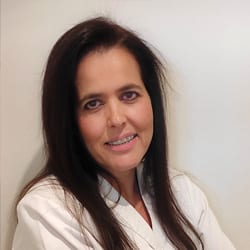We talk to Dr Natalia Garcia-Montaner, a specialist in gynaecology and obstetrics at Teladoc Health, about the menstrual cycle and the discomfort it can cause. Specifically we discussed those related to polycystic ovary syndrome, a very common condition in which there is a disruption in hormone secretion. She explains how to deal with it and what treatments are available.

What happens during the menstrual cycle?
During the menstrual cycle, important things happen in two parts of the body:
- Inside the uterus, a tissue called the endometrium is formed, which will nourish the pregnancy during the first few weeks if it occurs. It is built up during the first two weeks of the cycle and, if pregnancy does not occur, it is modified during the next two weeks so that it can be completely ‘dismantled’ during your period.
- An egg matures in the ovary during the first two weeks of the menstrual cycle, is released from the ovary during ovulation, and is taken up into the fallopian tube where it can be fertilised by a sperm in the right circumstances. If pregnancy occurs, the ovary that released the egg will secrete hormones to stabilise the pregnancy until the placenta is formed. If pregnancy does not occur, the egg disappears 3-4 days after ovulation.
What can cause the physical and emotional discomfort that some women experience during their cycle, and why can it vary over a lifetime or even from cycle to cycle?
During the menstrual cycle, a number of hormones and substances are secreted that are responsible for the symptoms associated with the premenstrual and menstrual phases.Ovarian hormones vary throughout the cycle, causing changes in mood, concentration, blood pressure, temperature and even glucose levels.
Oestrogens predominate in the first phase, making the woman feel more active and energetic; progesterone predominates in the second phase, giving a calmer and more peaceful feeling (which is maintained throughout pregnancy, if it occurs).
In the days before your period, if you are not pregnant, progesterone falls sharply and is responsible for premenstrual syndrome: a feeling of bloating, breast tenderness, tiredness and lack of energy and concentration, and mood swings with a tendency to irritability, anxiety or sadness. Prostaglandins have been stored in the endometrium, which is a substance that ensures that the endometrium. When it has not been useful in the absence of pregnancy, and is completely renewed, it contracts the uterus and is responsible for menstrual pain.

Many environmental factors such as diet, physical activity, sleep, stress impact this hormonal secretion, so the symptoms are not always reproduced in the same way and can vary from one cycle to another.
When should a woman see a doctor for menstrual cycle related problems?
It is normal to feel discomfort during the premenstrual phase and mild pain during the menstrual phase. Women are cyclical and must learn to live with it, and we can lead normal lives amidst relative discomfort, which is easily relieved with painkillers. If premenstrual symptoms or period pains are interfering with your daily life, you should see your gynaecologist. This does not necessarily mean that there is a pathology, there may be no cause, but it is necessary to rule it out and look for a therapeutic alternative, if necessary, which will allow you to lead a normal life throughout your cycle.
What is polycystic ovarian syndrome?
Polycystic ovary syndrome (PCOS) is a very common endocrine disorder with variable manifestations and, in most cases, a tendency to spontaneously improve over the years.
It is a disorder in which there is a disturbance in hormone secretion, leading to changes in menstrual cycles, which are rare or absent. It also promotes a predominance of certain hormones with a more “masculine” profile, responsible for hair growth in hormonally male areas (beard, moustache, chest…) or androgenic baldness (crown of the head, receding hairline) and excessive sebaceous secretion causing acne. It may also be associated with a carbohydrate metabolism disorder with insulin resistance, obesity, infertility and a characteristic ovarian appearance on ultrasound.
Is it common and how is it diagnosed and treated?
It is a very common condition, but it is often over-diagnosed because in the first decades of life it is normal for young girls to have some of the symptoms mentioned, due to the immaturity of the hormonal axis, without having all the manifestations of the syndrome, which do not require treatment.
There are two types of treatment, depending on whether the woman wants to become pregnant or not.
Treatment aimed at getting pregnant, which is sometimes made more difficult by sporadic and sometimes anovulatory cycles (cycles without a qualitatively good egg). The chances of getting pregnant with this treatment are quite good.
If pregnancy is not desired, the most common treatment is contraception, which normalises the hormonal profile and improves the symptoms of acne, hirsutism (excessive hair growth) and amenorrhoea (the absence of menstruation). Sometimes the approach is more endocrinological, with medication that improve carbohydrate metabolism and insulin levels.
What advice can we give women to help them cope with these symptoms?
There are certain behaviours that can improve the symptoms associated with the changes we experience during the cycle:
- Regular physical exercise, as it increases the synthesis of natural endorphins and reduces the production of prostaglandins, and acts as a muscle relaxant
- The application of localised heat to the pelvis or lower back, or massage, can also provide relief through its relaxing effects
- Diet: a diet rich in omega-3 fatty acids, found in fish oils, which reduce the synthesis of prostaglandins; magnesium, a mineral found in green leafy vegetables, nuts, seeds and whole grains; zinc; vitamin B or infusions of ginger, valerian, cinnamon, etc. can help you cope better during these days
- If this is not enough, analgesic guidelines or products that stimulate cellular cannabinoid receptors can be used as an alternative to classical analgesics, or hormonal contraceptive treatments that are highly effective in combating premenstrual syndrome and dysmenorrhoea.
Need some personal advice?
If you have any doubts about your menstrual health and you would like to discuss these with a doctor, please do not hesitate to connect to the doctors of Teladoc Health through our Ecare portal. Complaints don´t always have to be physical and if you feel anxiety or stress related to your menstruation or just in general, know that through the e-care portal there are also mental coaches available in a language and at a time that suits you best. We offer this service to our clients at no additional cost.


